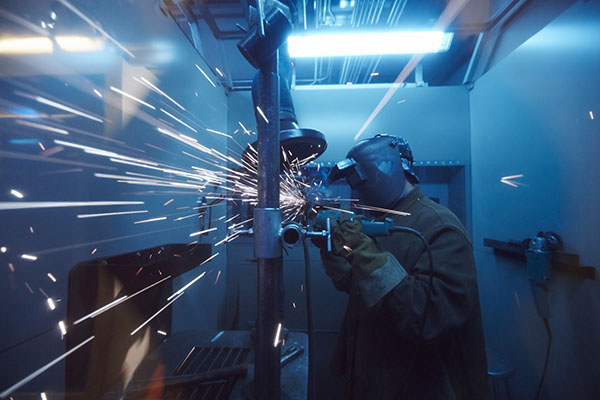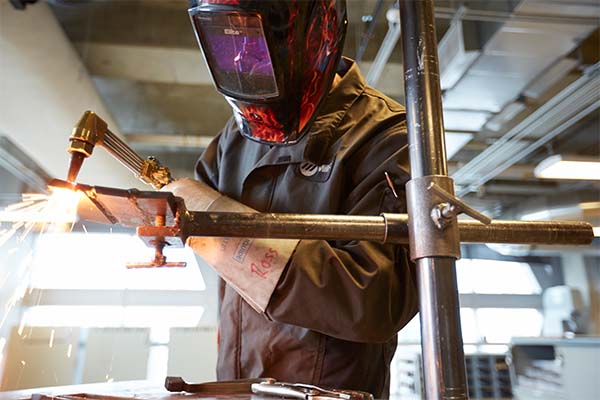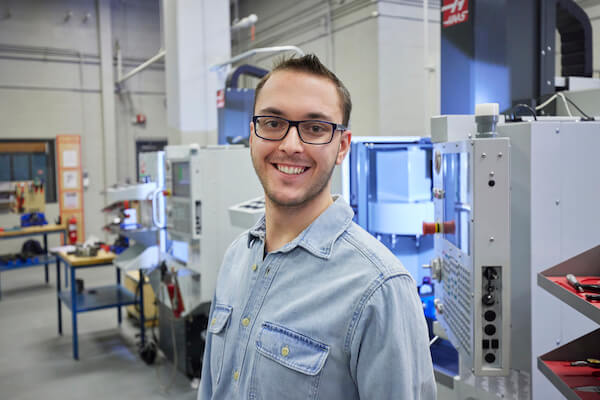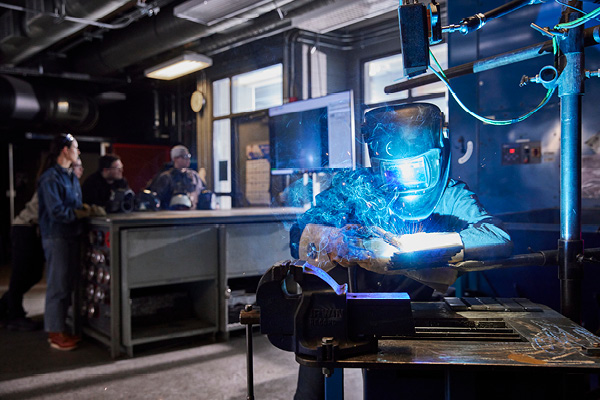On this page:
Overview
The Pre-Employment Welding program is designed to help you kick-start your career in welding.
Whether aiming to work in Alberta's thriving oil and gas industry or seeking opportunities in construction and manufacturing, this program provides the foundational skills necessary for entry-level positions and beyond.
You'll learn to join, shape and cut metal parts for various applications, from pressure vessels to industrial components. You will focus on skills pertinent to Alberta's oil service, pipeline and construction sectors.
Benefit from a mix of in-class theory, hands-on labs and extensive self-guided study to reinforce learning.
In this program, you will:
- learn wire feed welding, joint and weld types, identification of weld faults, and operation of oxyfuel equipment
- develop practical skills in welding techniques including Gas Metal Arc Welding (GMAW), Flux Cored Arc Welding (FCAW) and Metal Cored Arc Welding (MCAW)
- become proficient in oxyfuel cutting and gain an understanding of the oxyfuel process and safety
- adopt safe work practices throughout all aspects of welding.
You will learn from faculty with real-world experience to provide industry insights and mentorship, gain hands-on experience with current welding technologies and equipment, and get exposure to a network of industry and trade contacts and potential employers.
Upon completing this program, you will be eligible to challenge the written and practical exams for the first-period welding apprenticeship, fast-tracking your journey to becoming a journeyperson welder.
Work conditions for welders vary from one job to another. Welders may work outdoors on construction sites or indoors in production and repair shops. Travel may also be required for jobs such as oilfield-related welding. A 40-hour workweek is typical, but overtime is occasionally required to meet project deadlines.
If you're looking for a solid start in the welding profession, are self-driven in your approach to learning, and are committed to personal study, then this program is for you.
People in the welding field tend to be objective, methodical and innovative.
You need:
- manual dexterity
- good vision (corrective lenses are acceptable)
- strong hand-eye coordination
- attention to detail
- patience.
You should enjoy building things and working with little direction or supervision.
Graduates of this program are prepared to challenge the provincial level 1 apprenticeship trade examination for welders.
Once you pass the exam and complete the necessary training hours with an employer, you can begin a traditional apprenticeship in period two.
Upon successful completion of the program, you'll receive a SAIT Pre-Employment Welding certificate.
Careers and opportunities
Each year, SAIT conducts a survey between February and April to determine the employment rate, salary and satisfaction of our newest SAIT alumni.
![]() 83% graduate employment rate
83% graduate employment rate
Find out more about our graduate employment statistics >
Our graduates may work in the following occupations. Some careers require additional experience and education.

Career planning support
Unsure which career path is for you? Here are some recommended career planning resources to help you decide your future.
You can also head to Alberta alis for lots of information about careers in Alberta, including quizzes and labour market information to help you narrow down a path.
Finally, you can take our online career finder quiz, which can help narrow your options based on your current skills and interests.
Courses
The Pre-Employment Welding certificate requires 15 credits (six courses) to complete.
| Course | Credits |
|---|---|
|
Upon completing this course, you will have learned the fundamental mathematical principles necessary to meet the requirements of your program. The course covers the practical applications of fractions and decimals for trade-related calculations, including ratios and proportions, metric and imperial conversions, and geometric problems. |
1.5 |
|
This course is an introduction to welding theory. Learners are introduced to wire feed welding, joint and weld types, weld faults and oxy-fuel equipment. Emphasis is placed on safe work practices. |
3 |
|
This course provides opportunities to develop and practice welding skills. Learners develop practical skills in Gas Metal Arc Welding (GMAW), Flux Cored Arc Welding (FCAW), Metal Cored Arc Welding (MCAW) and oxy-fuel cutting. |
3 |
|
This course is an introduction to welding theory. Learners are introduced to tools, materials and processes in the welding trade. Emphasis is placed on safe work practices. |
3 |
|
This course provides opportunities to develop and practice welding skills. Learners develop practical skills in Gas Metal Arc Welding (GMAW), Flux Cored Arc Welding (FCAW), Metal Cored Arc Welding (MCAW), oxy-fuel cutting, Submerged Arc Welding (SAW), and plasma arc cutting and gouging. |
3 |
|
In this CWB certification lab, you will use the flux cored arc welding (FCAW) process in the 1GF weld positions while following the Canadian Welding Bureau's (CWB) qualification standards. You will also prepare the CWB welded test coupons and perform a guided bend test. |
1.5 |
Progression
You must attain a PGPA and/or a CGPA of 2.0 or better each semester and pass the prerequisite courses to progress through the program.
To qualify for graduation, you must pass all courses, attain a CGPA of 2.0 or better and complete course requirements within the prescribed timelines.
Admission requirements
Applicants educated in Canada
Applicants must demonstrate English language proficiency and completion of the following courses or equivalents:
- Math 10C or Math 10-3, and
- English Language Arts 10-1 or English Language Arts 10-2.
SAIT accepts high school course equivalents for admission for applicants educated outside Alberta.
All applicants who were educated outside of Canada must demonstrate English language proficiency and provide proof they meet the program admission requirements outlined above with an international document assessment. Find accepted educational documents and assessment options.
SAIT may also accept courses completed at certain international post-secondary institutions.

Academic Upgrading
Missing an admission requirement for this program? Upgrade your prior education to help you receive admission into one of SAIT's career programs.

English language proficiency
All applicants must demonstrate English language proficiency prior to admission, including students educated in Canada.
Transfer agreements
At SAIT, we evaluate post-secondary credit you have previously earned and apply it to your SAIT credential. Explore our formal transfer agreements available for this program.
We can evaluate your prior education, even if we don't have a formal agreement in place.
Submit a transfer credit application
There are no formal transfer agreements currently in place for this program.
Transfer options for graduates
Build on the knowledge you’ve learned at SAIT. The opportunity to advance your education at an accredited post-secondary institution may be available.
🔗 Visit Transfer Alberta search tool for all transfer agreements in Alberta (including UCalgary, MRU and BVC).
If there are transfer agreements with other institutions outside of Alberta, nationally or internationally, they will be listed below.
Available intakes
Fall 2025
Start dates:
- Domestic students: Waitlisted
-
-
Application deadline: June 30, 2025
-
Winter 2026
Start dates:
- Domestic students: Open
-
-
Application deadline: Oct. 24, 2025
-
Costs
2025/26 tuition and fees
The following estimated costs are effective as of July 1, 2025.
The estimated total cost of tuition and fees is based on completing the program within 13 weeks. Following a modified schedule will impact the fees you pay per semester and may alter final costs.
Domestic students
**Students in this program do not qualify for the UPass or health and dental plans, nor do they pay Saitsa fees.
Books and supplies are approximately $1,000 - $1,500 per full-time year.
This is a bring-your-own-device program with a standard computer hardware and software requirement. See the specific requirements on our computers and laptops page.
Find your booklist on the SAIT Bookstore's website. The booklist will be available closer to the program start date.
Can't find your program or course? The bookstore didn't receive a textbook list. Contact your program directly to determine if they're still refining course details or if you're in luck; no textbook purchase is required this term.
Required equipment/tools
Tools will be provided.
Required personal protective equipment (PPE)
You'll need CSA-approved steel-toe boots and safety glasses, welding gloves, earplugs (provided), a good-quality welding helmet, and FR coveralls or a welding jacket.
We recommend you hold off purchasing your equipment until after you begin classes. The industry-approved PPE will be discussed during your first few days.

Financial aid
Paying for your education may feel overwhelming, but we have resources and programs that can help, including information about payment options, student loans, grants and scholarships.
This program is eligible for Canada Alberta Job Grant funding.
Application process
Ready to apply?
Follow our step-by-step guide to submitting a successful application.
Communication during admission
Email is the primary source of communication during the selection process. Ensure your personal email account is managed appropriately to receive our emails, files and communications. We recommend you add the ma.info@sait.ca domain to your safe senders' list or you risk missing critical email messages.

Begin your application
Apply now using the online application portal.
Ensure you have a valid Visa or Mastercard to pay the non-refundable application fee of $120 for domestic applicants.
Information sessions
Prepare for a strong start in your chosen program or get the details you need to decide your future path.
Our expert staff and faculty are ready to answer your questions and provide information about the following:
- What sets SAIT apart
- An introduction to the program and area of study
- Admission requirements
- Future career paths
- Information on the earning potential and graduate employment rates.
Contact us
School of Manufacturing and Automation Advising
-
Phone - 403.284.8641
-
Email - ma.info@sait.ca
Subscribe for updates
Your journey starts here! Sign up to get important updates on:
- Manufacturing and automation programs
- Application information
- Relevant news and events

Oki, Âba wathtech, Danit'ada, Tawnshi, Hello.
SAIT is located on the traditional territories of the Niitsitapi (Blackfoot) and the people of Treaty 7 which includes the Siksika, the Piikani, the Kainai, the Tsuut’ina and the Îyârhe Nakoda of Bearspaw, Chiniki and Goodstoney.
We are situated in an area the Blackfoot tribes traditionally called Moh’kinsstis, where the Bow River meets the Elbow River. We now call it the city of Calgary, which is also home to the Métis Nation of Alberta.




